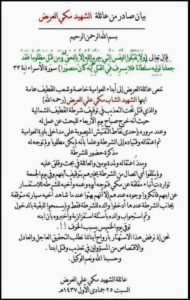On Friday, March 4, 2016, the young man Makki al-Orayedh’s family went to the police station to ask about their son two days after his disappearance, and was surprised by his death.
Makki, a 25 years old young man was a handball player at a local club. On Wednesday, March 2, 2016, he went out in his car to search for a job, and then his family lost contact with him. Two days following his disappearance, his parents went to the police station in Awamiyah to ask about him after worrying news about his death.
According to locals, the police detained al-Orayedh at a security checkpoint in Safavi – al-Awamiyah district of Qatif on charges of taking photographs for the checkpoint. The police claimed that he died of deep-seated fear.
Al-Orayedh’s family issued a statement in which they confirmed that their son was killed “under torture” in police custody in northern Qatif. The statement stressed that Makki was not wanted or summoned for questioning, and that the official authorities did not inform his family about his detention and when they went to ask about him they knew that his body was in the fridge and that he died of deep-seated fear.
Local sources confirmed that the family found signs of torture on his body when they took a look at it in the hospital fridge, such as signs of beating and electric shocks. They also noted that his corpse was not handed over in order to put pressures on his family to sign up that the causes of death were natural.
The European Saudi Organization for Human Rights ESOHR considers that the death of al-Orayedh is a result of the ongoing Saudi systematic violations in which both the international and local laws are being violated, such as the International Convention for the Protection of All Persons from Enforced Disappearance (ICCPEDD), where the Saudi authorities indented to hide him and did not inform his parents about his fate for two days. Besides, by arresting him without a warrant or an offense and killing him inside the prison, the Saudi government confirms its disregard for the human life guaranteed by Article III of the Universal Declaration of Human Rights.
The organization indicates that the allegations that the cause of death was deep-seated fear raises questions about the reasons which led to the feeling of fear, that is considered a violation of Article I of the Convention against TORTURE which shows that “torture means any act causing serious bodily or mental harm.”
In the light of the information that confirmed the existence of signs of torture on Makki al-Orayedh’s body, ESOHR calls upon the Saudi government for the immediate investigation in the case, according to Article 12 of the Convention on the Prevention of Terrorism to reveal the facts about the case and hold accountable those responsible for his death. The organization also demands for the compensation as stipulated in Article 14 in case of death.
The European Saudi Organization for Human Rights emphasizes that many detainees in Saudi Arabia have been tortured for several reasons, such as obtaining confessions, retribution or revenge, and this raises serious concerns in which torture is a systematic practice in the Saudi prisons, while the judiciary ignores the claims of torture made by the detainees during trails.
The ongoing support of the Saudi authorities for the policy of impunity, has contributed to the persistence of the executive authorities such as the police, detectives and others to practice torture, exposing the lives of detainees to danger, and to more disregard for the citizen’s dignity and this is an ever-increasing practice.
ESOHR calls upon the Saudi government for an immediate handover of the victim’s body which is still being held despite the lapse of 13 days of death, a transparent investigation in the circumstances of his death and for brining the perpetrators to a fair public trail. The organization also calls upon the Saudi government to allow for the visit of the UN Special Rapprteur on torture and other cruel, inhuman and severe punishments. It also considers that not allowing the Special Rapporteur to visit Saudi Arabia although he applied for a visit in 2006, 2007 and 2010 is a negative indication for not willing to stop the widespread practice of torture and the desire to cover up this systematic crime.

